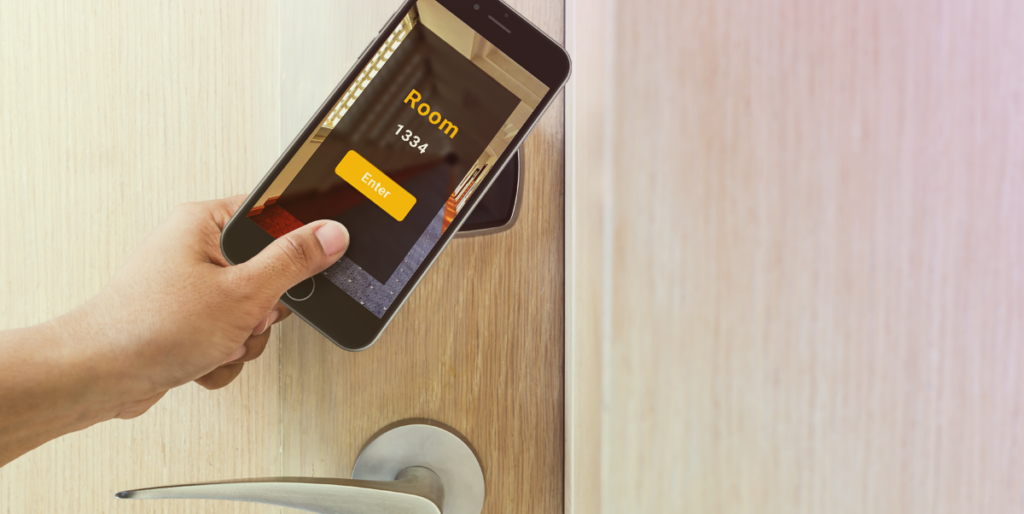Table of Contents
Clean bedsheets, fresh towels, polite receptionists, and decent room service are the things guests expect to have in every hotel regardless of the number of stars it has. This is because the hospitality industry has always kept the bar high in terms of the quality of services, and technologies have often been an essential part of positive advancements in this field.
Nowadays, guests are not satisfied with typical hotel room facilities such as an HD TV and a stocked minibar. The technological revolution has pushed the expectations of hotel customers with a focus on convenience. According to survey Oracle Hospitality amongst hotel guests in the U.S, 64% of guests consider it extremely important for hotels to improve their guest experience by investing in hospitality technology. However, innovations in services provide a competitive advantage for hotels by implementing them, increasing customer satisfaction and retention.
Nearly two-thirds of U.S. guests said it was “essential” for hotels to continue investing in technology to enhance the guest experience.
The main goal of hoteliers was to retain guests’ loyalty; it helps to get around competitors and establish trust and long-lasting relationships with customers. As much research has shown, the most important thing is providing an unforgettable experience for travelers. And technology can play an important role in this approach.
In this article, we made an overview of innovative hospitality technology that will wow your visitors and tools that can improve the efficiency of internal processes, thereby increasing revenues.
What Hospitality Technology Next Generation?
The technologies that make up back offices and hotel management systems are made up of different tools and structures. Besides, there are customer-oriented technologies, internal physical devices, and payment systems that need to be integrated with each other.
Without a strict standard for introducing new technologies into the industry, there will be chaos: the introduction of the same technology is different every time, which complicates the integration, and the cost of integration rises sharply. Yes, there is no clear procedure for this process, but on the other hand, the lack of standards makes the introduction of new tools and systems slow and ineffective.
Hospitality Technology Next Generation (HTNG), is an association serving hotel companies and technology providers. The union includes organizations that develop industry standards and help companies make the best decisions for their systems. The organization’s primary goal is to help hotels adopt new technologies in such a way that the compatibility of technological systems is maintained. We are talking about solutions such as property management systems, point-of-sale systems, telephone systems, building automation systems, guestroom entertainment systems such as video on demand, security and access control systems, and many others. The organization’s members meet regularly in small workgroups, where hotel companies and vendors work together to design interface standards, reference architectures, network designs, and hospitality-specific network devices. HTNG holds annual members’ meetings in North America, Europe, and Asia.
Recently, HTNG published a white paper regarding the implementation of voice technologies in hotels.
Voice Recognition
So what is this document about, and how do they plan to use voice technology?
This document aims to provide high-level guidance and set a minimum standard for the implementation of voice technology in hotels, including Amazon Alexa, Google Assistant, Apple Siri, Alibaba Genie, and Baidu Raven. There are other similar agents from major platforms and independent providers that handle natural language used in hotel rooms.
This framework provides both hoteliers and technology providers with a common language to discuss hotel scoring and ensure that hotel guests and staff have a positive experience with the evolving voice environment.

One of the best examples of voice technology in action in the hospitality industry is Amazon’s Alexa. It is based on Amazon Echo technology but can be adapted for any hotel. As a result, guests can talk to the gadget and control various devices in their rooms, such as lighting, heating, and music.
Several hotel chains have already implemented this technology, including Marriott. Soon, Amazon plans to expand Alexa’s capabilities, allowing guests to connect their own Amazon accounts to the hub. In other words, they can easily access their music collections, or audiobooks, and play them through the device.
Voice control technology, as well as other innovative tools, can be a great benefit to those in the hospitality industry, helping to boost personalization and improve the customer experience in general. Let look what else a hotel business can use to attract their customers.
Remote control tools
These tools allow for the remote management of a hotel room. Guests can easily control digital devices in a room even when they are not there. On top of that, remote control tools let guests and hotel administration create a room environment specifically adjusted to conditions and needs at hand.
A good example is the ABB-tacteo KNX sensor. It is designed for high-end luxury hotels and helps create a cozy atmosphere in a hotel room. Specifically, this sensor deals with such functions as heating, ventilation, air conditioning, lighting and even make blinds move automatically depending on the position of the sun. The ABB-tacteo KNX sensor can also perform some hotel management tasks such as load activation, do not disturb settings, and room number signaling.

Smart mirrors
A smart mirror is a regular mirror and a touchscreen where a guest can check their email and get some relevant information like the weather forecast or surf social media. Guests can see their dashboard by looking in the bathroom mirror while brushing their teeth!
Besides that, smart mirrors may have virtual concierge tools integrated into them, so guests can order some services while enjoying their reflections. This also opens new opportunities for the promotion of mark-up services a smart hotel offers.
In addition, some smart mirrors go with a language recognition feature, which means that they can serve as a voice assistant.
Another option of a smart mirror is a television integrated into a bathroom mirror. It allows guests to watch their favorite shows and not get bored while doing their daily bathroom routine.
To indeed fascinate hotel visitors, it’s also possible to combine several variations in one smart mirror. For instance, Remi, a smart mirror for smart hotels, can be either a TV or a virtual concierge.

Robots
Robots are also a popular way for hotels to go smart and attract a growing number of visitors. And although it’s more about the automation of simple and routine tasks like delivering toiletries to hotel rooms, guests are usually excited to interact with artificial intelligence and are ready to pay good money for such experience.
Speaking about the practical value of having robots in a smart hotel, the opportunities are indeed unlimited or better to say — limited only by your budget. For instance, robots can meet guests at a reception desk, provide them with different information related to a hotel, deliver items and food to rooms, store luggage, and many more.
If you still feel hesitant about getting robots for your hotel, we recommend you to visit Japan. Several Henna Hotels there are run mostly by robots with minimum human intervention and a great part of an available reservation is booked up for months ahead.
Virtual reality
Virtual reality technology can also significantly enrich your smart hotel and make a guest experience really unique and memorable. It’s mostly used for entertainment purposes, but, as with robots, the opportunities are limited only by your imagination and the amount of money you’re ready to spend.
The most popular application of virtual reality in hotels is virtual tours which guests can take by watching videos of local attractions via VR headsets. This, of course, cannot replace a real experience, but it helps guests decide which places to visit and which excursions to buy.
VR headsets are also used to entertain guests in hotels. For example, they can be placed in common areas like lobbies so guests can explore different virtual worlds (e.g. space, a ghost house) in their spare time.
Besides, hoteliers may consider introducing VR technology in sports and fitness areas. By doing so, visitors of their smart hotels will be able to take a run or ride a bike enjoying different virtual landscapes.
A story of One Aldwych, a five-star hotel in London is one of many successful use cases of virtual reality applications. When guests order a whiskey cocktail there, a bartender gives them a VR headset with a video showing how their beverage was made.
The ZOMEKit, a box that attaches to apartment buildings to turn them into smarter, more energy-efficient structures, has won the CES 2019 Innovation Award for smart city technology.
Conclusion
In recent years, hotel business began to actively introduce technological solutions, such as applications for guests, only to welcome them a little warmer. As the guests say and agree with them, the problem is not in the app, but in its capabilities. Guests want features that are an integral part of the hotel, such as virtual check-in / check-out, keyless access to rooms, and event booking and ticketing. Besides, 73% expressed interest in downloading an app that automatically connects to the hotel’s Wi-Fi.
FAQ
1. Artificial Intelligence.
2. Blockchain.
3. Augmented Reality and Virtual Reality.
4. Cloud Computing.
5. Internet of Things.
6. more
We noted that the introduction of technology does not mean quality interaction between the client and the staff. After all, human connections are essential in the hotel industry. And that they can only be improved, not replaced by technology. For example, employees can be equipped with mobile devices to access guest profiles, allowing them to deliver personalized services anytime, anywhere. The relationship between scale and service improvement and technology is designed to increase guest loyalty and revenue for both hotel chains and individual businesses.



